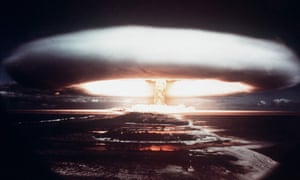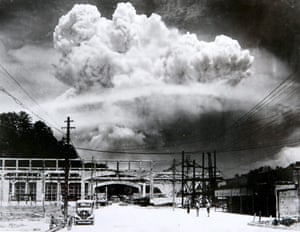
The Nuclear Confrontation by Rodric Braithwaite review – Armageddon and paranoia.An insider’s view of the ethical dilemmas and intelligence blunders that fuelled the cold war.As a lifelong diplomat whose last foreign post was as Britain’s ambassador to the Kremlin in the Soviet Union’s final years, Rodric Braithwaite acquired decades of insight into UK and US policy on nuclear weapons. In policy debates in Whitehall as well as in meetings with Soviet officials, he took part in numerous discussions on arms control. He has also read a phenomenal amount of the literature on “the bomb” and, unlike most other western researchers, has studied the work of Russian analysts. This includes the memoirs of physicists involved in the Soviet nuclear programme, many of which have not yet been translated into English.
Personal experience plus careful study have given him a remarkable platform from which he brilliantly dissects the ethical dilemmas facing the scientists who developed the weapons as well as the policymakers who framed strategies for their potential use, both groups knowing full well that they could bring humankind to Armageddon. There was equivalence on the western and Soviet sides and Braithwaite is absolutely fair in describing this.

He is equally even-handed when he comes to explain each side’s paranoia. Policymakers routinely accepted the worst-case analysis of the other’s arsenal, confusing capabilities with intentions and suspecting that the adversary was trying to sneak out of his proclaimed acceptance of parity by secretly developing a first-strike potential. With public access to official papers now available, Braithwaite writes that within months of Hiroshima the US drew up contingency plans to use nuclear bombs on the USSR to “deter or reverse any Soviet adventure in Europe”. Yet no proof has emerged that Stalin ever had such plans, he writes. Nothing changed with his successors. “There is no evidence that the Russians ever hoped to incorporate western Europe by military means,” Braithwaite adds, but western planners were bound to consider Soviet deployments as a potential invasion force since, as Anatoly Dobrynin, Moscow’s longtime ambassador in Washington, commented in his diary, “we were building up our nuclear and conventional arms in Europe beyond any reasonable measure”.

The atomic bomb drops on Nagasaki on 9 August 1945. Photograph: Nagasaki Atomic Bomb Museum/EPA
Braithwaite is especially interesting on the “special relationship” with the US, pointing out that the US initially tried to cut Britain out of any joint research on nuclear weapons. Successive British governments, Labour as well as Conservative, wanted the bomb because they did not trust Washington to defend Britain in all circumstances. The bomb also gave them, they felt, prestige. Braithwaite makes that last point in a bracket and with no attribution since he remains nothing if not discreet, rarely alluding to inside knowledge beyond a few references to his own “unpublished diary”.
As a career civil servant, Braithwaite had more affinity with the decision-making class than with street protesters. He has little to say about the Campaign for Nuclear Disarmament (CND)although he mentions that MI5 for 25 years described it as “communist-controlled”. This was an extraordinary intelligence blunder which Braithwaite merely puts in a footnote. He ignores European Nuclear Disarmament (END), which had links with eastern European peace campaigners, and makes only one brief mention of its leading light, EP Thompson. Instead, he repeatedly stresses that the massive anti-nuclear demonstrations in the UK and US had no effect in changing government policy, seeming to find satisfaction in the fact that all this public noise was, in his view, unsuccessful.
Successive British governments wanted the bomb because they did not trust Washington to defend Britain
This reaction is baffling since Braithwaite shows considerable sympathy for the top policymakers who, in the psychological comfort of losing responsibility on retirement, came out against the bomb, including former US secretaries of state George Shultz and Henry Kissinger. If you admire the sinner who repenteth, why be so dismissive of the scruffy saints who went marching past with banners that displayed the same message?
Braithwaite ends his book with the conclusion that “whatever their nationality, the politicians were trapped in a web of inexorable logic. The nuclear weapon could not be uninvented. If their opponent had it or was getting it they too had to have it if they were not to fail in their patriotic duty”. That is not wholly true. Earlier in the same chapter he mentions that Canada, South Africa, Argentina and Brazil were capable of acquiring the skills necessary to develop their own nuclear weapons but renounced them. He could have added that Belarus, Kazakhstan and Ukraine, which already had them on their territory, gave them up. It might have been useful to examine the reasons why all these states went non-nuclear and the way their publics reacted. The evidence would suggest that in some contexts it need not be a politician’s “patriotic duty” to have the bomb. Abandoning the nuclear option may make better national sense and command broad political support.

CND demonstrators on a march from London to Aldermaston in 1958. Photograph: Keystone/Getty Images
The key issue in any country is the perception of the threats it faces. Could there be alternative ways of defending or insuring against them without resort to a nuclear arsenal? One man about whom Braithwaite writes with admiration is Joseph Rotblat, a Polish émigré physicist who worked on the Manhattan project to develop the US bomb but after Hitler’s defeat became a campaigner for nuclear disarmament and set up the Pugwash conferences of international scientists. (He won the Nobel peace prize in 1995). Based in Britain, Rotblat was a member of the Alternative Defence Commission, a group of British scientists, academics and peace campaigners, which produced two reports in the 1980s that looked at the threats facing the UK and analysed how defence and foreign policy could meet them satisfactorily without nuclear weapons (Full disclosure: I was a member of the commission, too).
Many of the ideas the commission put forward – “sufficiency’, “non-offensive or non-provocative defence” and “interdependence” – emerged in the policies advocated by Gorbachev’s advisers during perestroika. It remains an irony that CND and END were attacked as dupes or fronts for Moscow while influence actually went in the opposite direction. Even under Brezhnev there were hints of this. The Kremlin’s 1982 declaration that it was adopting a strategy of no-first-use of nuclear weapons mirrored the western peace movement’s position. Whitehall and Washington may have been stoney-faced towards peace movement demands; Moscow was less so.
No comments:
Post a Comment